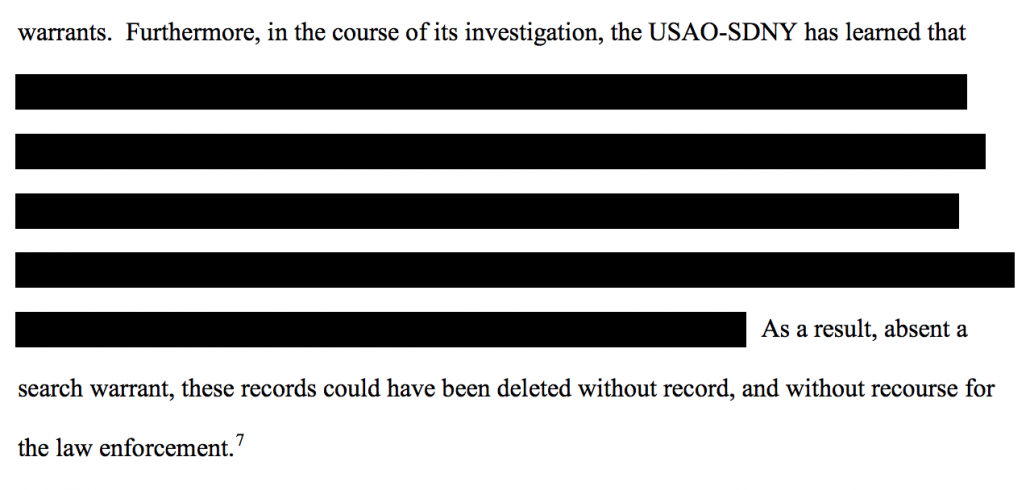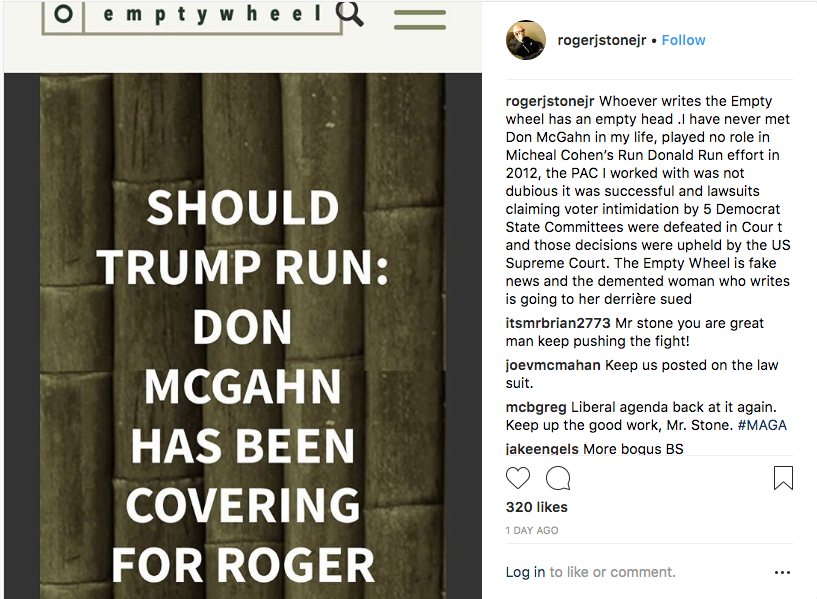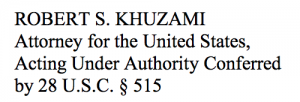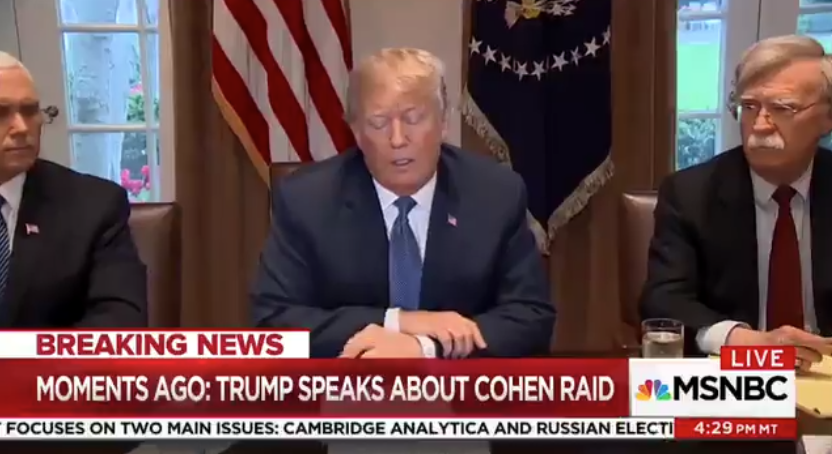At 2PM today, in a court room in southern Manhattan, a lawyer someone hired last Wednesday to represent Donald Trump, Joanna Hendon, will push prosecutors from the Southern District of New York to explain that they have probable cause to believe crimes involving the president have been committed. Here’s why.
Last Monday, the FBI served Michael Cohen warrants listing crimes known to pertain to his taxi medallion businesses and his efforts to suppress information about Trump’s embarrassing sexual behavior, though the warrants themselves probably listed bank fraud, wire fraud, and campaign finance violations as the crimes. “[T]he riders to the search warrants – copies of which have been provided to Cohen – identify the federal criminal statutes under which Cohen is being investigated,” the government emphasized in its memo.
The taxi medallion stuff has no known tie to Trump. The hush arrangements clearly do, but at least in the case of Stormy Daniels, Trump and Cohen have both publicly denied an attorney-client role, which the government pointed out. “President Trump has publicly denied knowing that Cohen paid Clifford, and suggested to reporters that they had to ‘ask Michael’ about the payment.” It’s certainly possible Cohen has claimed to have firewalled Trump in other hush payments in the same effort to avoid campaign finance violations; to the extent that Trump has not been a formal party in those agreements, he may have likewise waived privilege.
And then there’s the crime-fraud exception to privilege, which the government invokes four times in its response to Cohen, describing how an investigative team can legally access such materials without approval from Cohen or his client if a judge okays it.
[T]he Filter Team will review them to determine whether the material is: (1) not privileged, (2) potentially privileged, (3) requires redaction, and/or (4) potentially meets an applicable exception (for example, the crime-fraud exception). To be clear, under no circumstances will a potentially privileged document or a document potentially subject to the crime-fraud exception be provided to or described to the Investigative Team without the consent of the privilege holder or his/her counsel, or the court’s approval. If the Filter Team is unable to clarify a document’s category, or if there is an exception to the privilege that applies to particular material, such as the crime-fraud exception, or any waiver of the privilege – the Filter Team will (1) confer with counsel for the privilege holder at the appropriate time and before any such material is shared with the Investigative Team and, if no agreement can be reached, submit the material under seal to an appropriate court for a determination as to whether the material is privileged;
[snip]
In the face of inaccurate and/or overbroad claims of privilege, the USAO-SDNY would be seriously prejudiced if it were not able, through a Filter Team, to evaluate the validity of such claims. As Judge Barbara Jones explained in permitting review by a filter team, “[w]ithout the benefit of such a review, the privilege team would likely be unable to argue, for example, that no attorney-client privilege attached to the communication because of the crime-fraud exception, or that a document should be available for use at trial, regardless of work-product contents, because of necessity and unavailability by other means.” [my emphasis]
Even though the FBI informed Cohen he was raided as the subject of an investigation pertaining to his own business, he fought the memo by invoking the part of the US Attorney’s Manual pertaining to witnesses, not subjects, which SDNY corrected.
Cohen’s reliance on the USAM misplaced, but he invokes the wrong section. Cohen cites to section 9-19.220 of the USAM, which, as Cohen points out, applies to “attorneys who are not suspects” of a criminal investigations. See Br. at 22; USAM § 9-19.220 (noting the procedure to be followed when privileged materials are sought from a “disinterested third party”). Cohen, however, is not the disinterested third party contemplated by the USAM. The applicable provision is that which applies when the attorney is a “suspect, subject or target” of the investigation.
And even though he was told he was being investigated for crimes unrelated to it, his lawyers nevertheless treated the raid as part of the Mueller investigation. Their description of communications with SDNY, for example, begins this way, followed by several redacted lines.
On April 9, 2018, Mr. Cohen’s legal counsel was advised in a telephone call by an Assistant United States Attorney from the Southern District of New York, that the Office of Special Counsel (Robert Mueller) had “referred a portion of” the subject matter of the warrants to the U.S. Attorney’s Office for the Southern District of New York. Id. ¶ 31. Each page of the attachments to the search warrants contains a footer with the date “2017.08.02” (August 2, 2017)—that happens to be the same date that the Office of Special Counsel’s jurisdiction was amended by the Deputy Attorney General. One obvious and credible explanation is that the attachments listing the subject matter of the warrant used by the U.S. Attorney’s Office were drafted by the Office of Special Counsel as earlier as that date. [three lines redacted]
The government, in addition to mocking Cohen’s assumption based off the footer metadata, reveals what that redaction hides: Cohen speculated, “see Br. at 10, that the SCO drafted the search warrants.”
Nevertheless, both sides treat Cohen’s attempt to treat this as a question of the Russia investigation seriously. The government provides three pieces of evidence to describe why Cohen couldn’t be trusted to turn these materials over pursuant to a subpoena — because the crimes themselves involve fraud and deception, because he had, by Friday, already invoked the Fifth in the Stormy Daniels civil suit suggesting he’d withhold documents here as well, and because a tantalizingly redacted passage that suggests Cohen or someone else has already started destroying evidence…

In addition, however, the government does contest Cohen’s claim that he fully cooperated with any of the three Russia investigation his lawyer addresses at length in his declaration, which (having treated this raid as part of the Mueller investigation rather than pertaining to separate crimes) he uses to argue that Cohen could be trusted to turn over documents willingly. For example, the government notes that Cohen himself has said he didn’t cooperate with the Congressional investigations (and wasn’t treated as a target).
It appears that Cohen was not a target of those investigations. Additionally, while Cohen claims in his motion to have been cooperative, he offers no support for this assertion. Publicly, Cohen suggested the opposite, telling Time Magazine that he declined a voluntary request from Congress because it was “too broad.”
Even better, and critically important to the Trump filing submitted last night, is where SDNY fact checks the Cohen claim, backed by his lawyer’s sworn declaration, that he hadn’t fully cooperated with Mueller’s investigation because Mueller asked for everything.
Cohen also states that the SCO “had requested that the Trump Organization produce all of Mr. Cohen’s communications that were within the Trump Organization’s custody, possession, or control,” and that Cohen objected “on the grounds that [the request] called for production of privileged communications, among other things.” (Br. 8-9). Although in the ordinary course, the USAO-SDNY would not comment on investigative requests or demands made to third parties, particularly those from a separate office undertaking its own, independent investigation, in light of the representations made by Cohen’s counsel, USAO-SDNY contacted the SCO about these representations and understands they are not accurate. In particular, the SCO did not request that the Trump Organization produce “all communications” by Cohen in the Trump Organization’s possession or control irrespective of subject matter or privilege. Indeed, the request made by the SCO was considerably narrower, and specifically omitted, among other things, any documents that were protected by privilege or of a purely personal nature. Cohen nonetheless objected to that request for documents and, after discussions between Cohen’s counsel and the SCO, the SCO decided not to seek production at that time. That Cohen sought to preclude the Trump Organization from producing these third party communications belies both (i) his general assertion of cooperation, and (ii) his stated principal interest in protecting attorney-client communications. Indeed, a careful review of Cohen’s motion papers reveals that he does not purport to have personally produced any documents to the SCO.
The intransigence pertaining to Cohen’s documents involving the Trump Organization continued over to last week’s response. While the Trump Organization (which I suspect is really who hired Hendon) did not request to be party to this fight, they did send SDNY a letter last week demanding that it return every document involving Cohen and the Trump Organization.
USAO-SDNY has already received correspondence from counsel for the Trump Organization (Cohen’s former employer), which referenced the searches conducted of Cohen’s premises and claimed:
We consider each and every communication by, between or amongst Mr. Cohen and the Trump Organization and each of its officers, directors and employees, to be subject to and protected by the attorney-client privilege and/or the work-product privilege.
As a reminder: in March, Mueller subpoenaed the Trump Organization for documents, including but not limited to Russia. That’s one reason, I suspect, that Cohen believes this raid is partly about supporting Mueller’s investigation (I wonder whether Trump Org is the entity that has started destroyed documents?). And that’s one reason, I suspect, that Cohen’s team made a bid to review the seized documents for responsiveness (they use the word 13 times in their filing) before SDNY’s taint team gets the documents.
That is, in addition to whatever other crimes Cohen has facilitated for the Trump Organization, he wants to make sure that the government can’t use materials seized in this raid to investigate other crimes, such as those Cohen might be suspected of in relation to the Mueller investigation.
Having failed to cooperate with both the congressional and Mueller investigations, which is one reason SDNY cites for having used a warrant rather than a subpoena, Cohen now wants to reset the clock so he can treat this raid as a subpoena rather than a warrant so he gets to decide what is responsive to the crimes he is being investigated for or even to the demands of the Russia investigation.
Frankly, to the extent that Mueller might use Cohen’s own crimes as an excuse to search his documents (which the FBI seems to have sorted, even to the level of describe specific checks on the search warrant returns) and his devices (which they seized) to find materials relating to the Russian investigation, I’m sympathetic to Cohen’s case. Sure, Mueller can and may already be working on obtaining warrants to search for materials he might use now that the devices are in the government’s possession. But given how advanced the Mueller investigation is, it seems the government should be expected to obtain separate probable cause warrants rather than rely on plain view doctrine to search for materials on Cohen’s devices relating to Russia.
All of which brings us to the letter Hendon submitted last night on behalf of Trump personally. Herndon actually goes several steps further than Cohen’s team did (while he asked to do the first review, he made a concerted case to appoint a Special Master to do it), asking that Cohen get copies of the seized materials, after which Cohen will decide what pertains to Trump, which Trump will then get to review to decide whether he will assert privilege, only after which SDNY will be permitted to object.
1. Enjoining the government from using a taint team to conduct an initial privilege review;
2. Directing the government to provide Mr. Cohen and his counsel with a copy of the materials seized from Mr. Cohen by the government on April 9, 2018;
3. Directing Mr. Cohen and his counsel, after the government provides Mr. Cohen and his counsel with a copy of the seized materials, to identify to the President all seized materials that relate to him in any way and to provide a copy of those materials to him and his counsel;
4. Directing the President and his counsel, after they review the materials provided by Mr. Cohen, to identify for the government’s taint team all materials over which the President asserts privilege;
5. Authorizing the government’s taint team to raise any objections to the President’s assertions of privilege with the Court; and
6. Prohibiting the government’s taint team from providing the Investigation Team with (a) any materials over which the President asserts a privilege without objection from the taint team, and (b) any materials that the Court rules are privileged over the taint team’s objection.
This effectively flips the process on its head, turning the seizure back into a subpoena situation. And while Herndon doesn’t make this as obvious as Cohen’s team did, they intend the Cohen and Trump reviews to include a review of responsiveness as well as privilege.
The level of protection provided to the privilege-holder in the familiar context of a grand jury subpoena duces tecum should be accorded to the President here. When a grand jury subpoena for documents is served, the recipient, with the advice of his counsel, reviews the documents in his possession and produces the responsive documents, with one critical exception: with notice to the government, the recipient withholds all responsive documents that he and his counsel conclude are subject to a privilege, identifying such documents in some fashion without disclosing the privileged contents, often by means of a privilege log. [my emphasis]
Curiously, Herndon doesn’t contest that the government has good reason to believe materials have gotten destroyed, but says that now that the government has obtained the documents, any risk of destruction is gone. Here’s the entirety of the section where Herndon addresses the government’s need to seize these documents.
Of course, here, the government chose not to serve a grand jury subpoena, but instead to execute search warrants on an attorney’s office, residences, and effects. The government asserts that this truly extraordinary measure was necessary to prevent the destruction of evidence. (Gov’t Opp. at 14.) But even if that is true, the exigency has dissipated entirely, as the seized materials are now in the government’s control, beyond any of the potential misuses of the materials that motivated the seizure in the first place. Therefore, the fact that the government seized privileged documents rather than subpoenaing them is now irrelevant – except for the profoundly important privilege issues that the government’s unilateral and peremptory action has raised.
The government insists that it is “entitled” to the seized materials. (Id. at 2, 19.) However, to the extent the government seized privileged information, it is not entitled to have that information, much less review it. See, e.g., von Bulow, 828 F.2d at 99 (recognizing the “urgent” “need for timely protection [from disclosure] … where the discovery sought is … blanketed by the absolute attorney-client privilege”). It simply cannot be the case that by acting in such an aggressive, intrusive, and unorthodox manner, the government has somehow created an entitlement on its own part to eliminate the President’s right to a full assertion of every privilege argument available to him. Indeed, if the Court were to endorse the use of a taint team under these circumstances, raids of law offices would likely become more commonplace, as they would permit the government to wrest from the privilege-holder the ability, in the first instance, to assert privilege over documents and rightfully withhold them.
The government has done what it has done, and it has thereby protected against every notional evil it could have articulated in favor of its action. It no longer has any cognizable interest in proceeding by any procedure other than that which is typically employed to ensure that the attorney-client privilege is fully protected.
Note what has fallen out of the discussion of exigency? The crime-fraud exception, which SDNY had made clear it expected to find ample evidence of.
Elsewhere, Herndon does mention SDNY’s expectations of finding materials that fall under the crime-fraud exception, but she suggests that a taint team cannot be trusted to access the documents first because it might provide the investigative team documents that are clearly not privileged, a non sequitur to the point of crime-fraud exception documents.
The government has assured the Court that “under no circumstances will a potentially privileged document or a document potentially subject to the crime-fraud exception be provided to or described to the Investigative Team without the consent of the privilege-holder or his/her counsel, or the court’s approval.” (Gov’t Opp. at 6.) Presumably the government intends by those words to comfort the Court, but the government simply cannot make that guarantee. See, e.g., Lek, 2018 WL 417596, at *1-3. As discussed above, under the government’s proposal, the taint team will turn over to the Investigative Team all materials that the taint team itself deems not privileged. If such materials contain any privileged information that the taint team failed to identify, the President’s privilege will be irremediably violated. The President, the public, and the government have a vital interest in ensuring the integrity of the privilege review process, and the taint team procedure is plainly inadequate to the task. [my emphasis]
Remarkably, Herndon suggests that the public (!!!) has an interest in letting criminal suspect Michael Cohen, who has already proven uncooperative with valid investigations, sort through his materials to decide whether the government should have documents that prove he abused his position as a lawyer to commit fraud on behalf of a client.
As the government has said, it’s not clear Cohen has any clients besides Donald Trump.
Which is why I suspect SDNY is going to provide details in court today of the crimes that it has probable cause to believe were committed. Because, in the face of an otherwise compelling claim that this is an exceptional case, what SDNY is investigating is still that Cohen served not to provide legal advice to Donald Trump, but to provide legal cover for fraud.
I have no idea what Kimba Wood will do in response (and I suspect SDNY will challenge the legal precedents Herndon has invoked).
But I suspect we’re going to hear a lot more about how SDNY has reason to believe that Michael Cohen hasn’t been serving as a lawyer for Trump, he has been serving as a fixer for him.
And Stormy Daniels will be looking on as evidence of that fact.
Update: In their filing laying out the scope of what Michael Cohen considers privileged this morning, his lawyers make their concerns about plain view doctrine even more explicit.
The choice here is between allowing the Government to make an end run around the Fourth Amendment by scooping up and viewing all of the communications seized in the search of a lawyer’s office (in this case, all of the documents and data of the President’s personal attorney) regardless of whether the documents seized were the subject of the judge’s original probable cause determination, or appointing a neutral third party to conduct that review. If the government can obtain a search warrant for particular items but then seize and review everything in an attorney’s office, the protections of the Fourth Amendment are meaningless.
[snip]
In addition, a Special Master should be appointed in the interest of the administration of justice to ensure that the Government does not have access to materials for which they have not yet shown would be obtained through a valid search warrant through a showing of probable cause. In obtaining the search warrant, the Government had to make a showing of probable cause that Mr. Cohen is in possession of evidence of a crime. The search warrant is designed to allow the Government to obtain that material – and that material only.
And they again invite SDNY to lay out evidence that this stuff isn’t covered under the crime-fraud exception.
Moreover, without proffering any evidence of its applicability, the government referred to the “crime-fraud” exception in its opposition brief, (Gov’t Opp. Br. at 6, 10), and during oral argument. 4/13/18 Tr. at 28. The government also referred to its search warrant application – which we have never seen – as including “evidence for the crimes that were set forth in [a] detailed affidavit.” 4/13/18 Tr. at 60. Since there is, according to the government, an “ongoing grand jury investigation” (which is required to remain secret), it would most certainly be embarrassing and “detrimental” to Mr. Cohen’s clients if he were to reveal their identities publicly.








